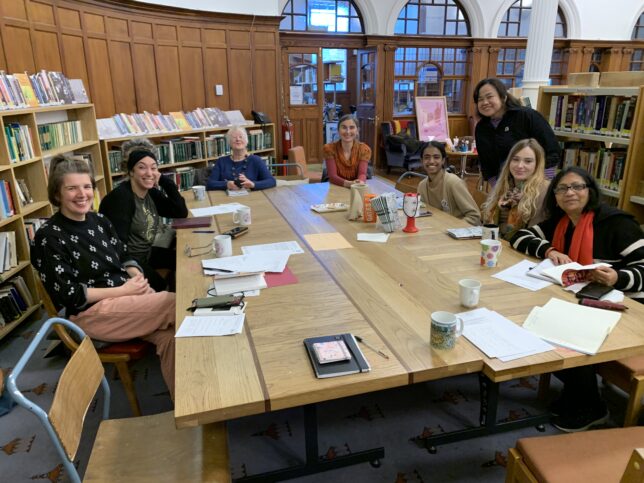Next on the agenda for GWL’s Sexology Season is a series of facilitated discussions on sex.
What Women Talk About When They Talk About Sex will be running fortnightly from 7th May (this Thursday) and is a discussion group open to anyone who wants to share how sex, sexuality or sexual identity is playing out in their lives.
Sitting round with bunch of people you don’t know and talking about what is probably a pretty private part of your life may sound daunting. It may sound weird. It may sound pointless. But, making yourself heard and hearing others talk about their desires and experiences is really powerful. What’s more, it has an awesome way of not only being deeply personal but also deeply political.
These kinds of workshops, where women sit together to share and discuss go way back, and were used as a technique called Consciousness Raising in the 80s. This model is what GWL is basing these sessions on. It may sound obvious, but 2nd wave feminists realised that the structures of the Patriarchy run so deep in our culture that often a lot of us aren’t aware of the ways in which we might be repressing our sexual selves (us also applies not just to women, but all genders). Women weren’t going to start calling themselves feminists if they didn’t see that there was a fight for freedom to be had.
You can find out more about these models in the library itself:
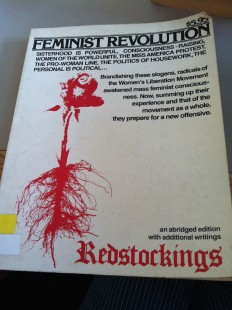
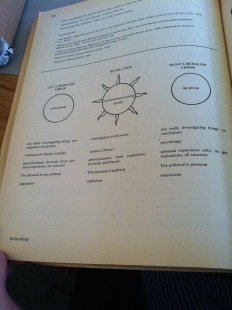
I did some reading myself, and Feminist Revolution has some wonderful stories of women realising things like others too faked orgasms and perhaps that they didn’t have to. Perhaps they too deserved pleasure. As I mentioned in a previous blog post, feminism has divisions in its school of thinking – known as sex-negativity and sex-positivity. Some feminists/feminist thinking from this era has tended to be somewhat old school, and often leans dangerously towards dictating how women should be as sexual beings (not wear high-heels or lacey bras etc.) But, not all thought from this era is sex-negative.
What is amazing about actual live chats with other real people is that hopefully we can get past trying to argue for either camp, and realise the complexity of sexuality by listening to one another. Julia Serano – who I mention in the above blog link- has a great chapter on Ambivalence in her book Exluded, available in the library if you want to read more on this specific area.
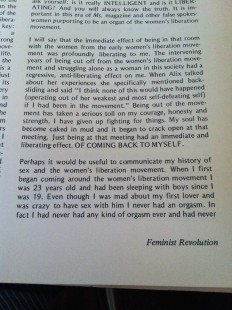
I wanted to throw in this quote from an essay by Stevi Jackson around this time – on why a woman owning their sexuality, not simply in relation to men, is important. She critiques famous psychoanalyst Freud for the way he characterises female sexuality as a repressed version of male sexuality.
“The fact is that the male sex is not only considered relatively superior to the female, but it is taken as the universal human norm. This is an integral part of Freudian theory; the libido is seen as an active, masculine force. If female sexuality is assumed to be the product of a repressed libido, there is danger of perceiving it as either a distorted version of the masculine or as a functional complement to it” – p.64/65, The Social Construction of Female Sexuality, Feminism and Sexuality, 1996
What Jackson is basically saying is that women deserve to not have to be defined in relation to men – or to only be characterized as submissive. The right to express sexuality freely and fluidly is something that women all over the world are still fighting for. Read this Everyday Feminism article on the ways we can improve how women think about themselves in relation to sex.
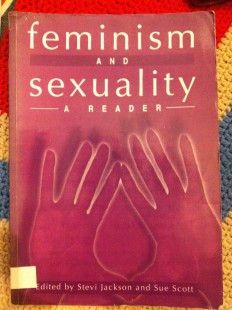
To break away from theory (of which there is A LOT of) and to demonstrate the diverse experiences just in GWL staff, I asked some of the sexology team to talk about when they first knew what sex was and why they feel talking about it is important.
Wendy Kirk: Librarian
I do remember first learning about sex, mostly through talking with my female friends. Despite having an older sister and a very close relationship with my Mum, it wasn’t really something that we talked about at home, although I do remember there being an unspoken belief that it was ‘better to wait until you were married’. I remember my friends and I reading Judy Blume books, such as ‘Are you there God, it’s me Margaret?’ and ‘Forever’ and feeling like we were very daring! Books like these really opened up a way for us to talk about sex and sexuality. We were able to talk about fictional characters as a vehicle for talking about ourselves really.
Megan Mitchell: Sexology Film Season Curator
I was really lucky in that my mum was always very open about sex and relationships, and just not heteronormatively, so I never felt embarrassed or reluctant to ask or talk about anything like that.
Adele: Creative Development Manger
Not the precise moment but I do remember taking my lovely, helpful ‘learning about sex’ children’s sex education book bought by my parents to Junior School (without their knowledge) as I thought it was cool and when it was discovered that I was showing it to everyone in the playground being told off by teachers and my parents having to deal with the flak from disgruntled parents.
On the importance of discussion:
Wendy
When things are shrouded in secrecy or not out in the open, it is so easy for dangerous mistruths and misconceptions to thrive. It is absolutely essential for women to feel comfortable and in control of their own sexuality and their own bodies. This cannot happen if we don’t talk about it!
Adele
There will be space for all to talk about sex in GWL. With confidentiality, safety and support ensured we are hoping that this new group of women, who will come together for this programme (no pun intended!) will take courage to bring their diverse backgrounds, experiences, pleasures and disappointments to share, and of course there will inevitably be lots of laughter… and cake
Whether you’re well versed in talking about sex and sexuality, or if you’ve never been part of discussion before, GWL opens its doors to you. Claiming our authentic desires takes bravery, but with the support of others I promise the journey is a lot less scary.
One final note from Wendy our librarian – absolutely all kinds of women with all kinds of experiences welcome! In fact, diversity is what we want!
It’s almost as if women are ‘allowed’ to be sexual beings, as long it they fit in with, and don’t challenge, society’s preconceived notions. Women’s experiences of sex and sexuality are hugely diverse – because women are hugely diverse. The more we hear these diverse voices, the better we will be able to counter the double standards and damaging stereotypes.
These are fortnightly sessions taking place on Thursdays, 7th & 21st May and 4th June 2015
6pm to 7.30pm
The sessions are free of charge and you can book below (you will be taken through the shopping cart but no charge will be made) or you can call us on 0141 550 2267.

